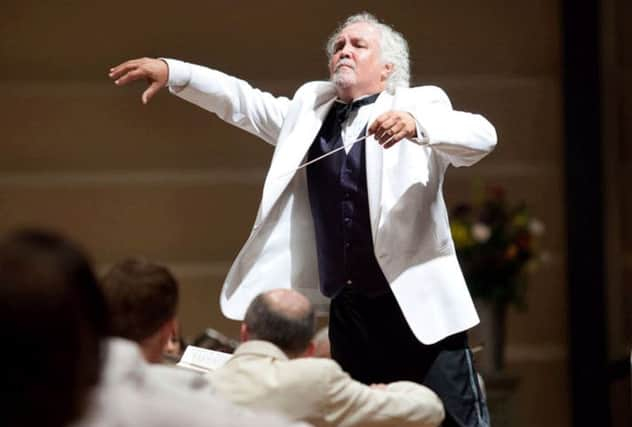Donald Runnicles on his career as SSO conductor


It may seem a little premature to be looking back over Donald Runnicles’ five years as principal conductor of the BBC Scottish Symphony Orchestra. After all, he doesn’t step down until 2016, and even then, as he announced a couple of weeks ago, he is to remain with the orchestra as conductor emeritus. So while we may be seeing less of him, he’ll most certainly still be around.
But this decision comes at a pivotal moment in his life. Runnicles turns 60 on 16 November, an occasion a week tomorrow that will be marked by a performance of Beethoven’s Ninth Symphony at the Usher Hall. It was approaching that personal milestone, he says, that spurred on his decision to cut back.
Advertisement
Hide Ad“Reaching this age has made me evaluate my life, think about what are the priorities, especially my family, and I came to the decision that I couldn’t commit as many weeks to the SSO as I currently do,” says the Edinburgh-born maestro, whose career began, after studying at Cambridge, in the opera houses of Germany, before moving to America as music director of the San Francisco Opera, then back to Germany, where he lives, and where he is now at the musical helm of Berlin’s prestigious Deutsche Oper.
Surprisingly, his appointment to the BBC SSO at the age of 53 was his first in his native Scotland. But it was one that was clearly meant to be. Take as a recent example last month’s jaw-dropping performance of Berg’s opera Wozzeck, yet another triumph of fearless ambition, uncompromising standards and outstanding musical symbiosis. “It may seem to some a strange time for me to be saying I’ll be doing less, but doing less makes no difference to the actual relationship I will continue to have with the SSO,” Runnicles says.
If you’ve never experienced that special relationship, which was a crowning feature of so many Edinburgh International Festival performances well before he took up his official conductorship of the orchestra in 2009, this week provides the ideal opportunity. For it is in the symphonic giants of the repertoire, not to mention the many operatic concert performances he and the SSO have enjoyed together, that this charismatic partnership has been especially explosive.
It’s partly to do with an obvious chemistry between him and the players. Ask any of the SSO musicians and they will tell you it’s to do with his natural musicality and ability to convey that through his unorthodox left-handed beat. Ask Runnicles, and he reckons it’s all about trust. “That’s a two-way street: not just about a conductor trusting an orchestra, but the orchestra trusting him to take them on a musical journey, in directions they wouldn’t normally have gone. That’s what I’ve found with the SSO. They are a constant source of inspiration to me.”
But it’s also to do with Runnicles’ pulling power in attracting the very best soloists from around the world, not least when it comes to singers. Clearly his connections in the operatic world help, and there has rarely been an SSO performance where the singers – stellar voices such as Heidi Melton and Nina Stemme – haven’t blown us away.
And there’s no change this week, with a Beethoven’s Ninth line-up in Glasgow, Aberdeen and Edinburgh of New York Met stars Angela Meade (soprano) and Elizabeth Bishop (mezzo soprano) alongside Australian tenor Stuart Skelton and leading Deutsche Oper baritone Marko Mimica.
Advertisement
Hide AdRunnicles’ key musical ambition with the SSO was always “to continue to explore repertoire that was already familiar to me”. That, he says, means primarily the symphonies of Bruckner, Mahler, Shostakovich and Beethoven.
Yet his first encounter with the orchestra – at the Edinburgh Festival in 2001 – sowed the seeds of an area of music making that was to feature highly in his programming policy with the orchestra. “That was a concert performance of Berlioz’s epic opera The Trojans with [the late] Lorraine Hunt Lieberson and Petra Lang,” he recalls. “I was intrigued, not to say overwhelmed, by the fact this was one of the best performances of an opera I’d ever experienced. The orchestra was absolutely on fire.”
Advertisement
Hide AdWhat made it so special, he adds, is that “you cannot assume that symphony orchestras are necessarily going to to enjoy accompanying and playing a subordinate role on occasions. That’s when I realised that the SSO was a rare beast indeed, and that’s why I thought we could explore opera together.”
It was an inspired decision, and a journey, especially in a country where live opera is in decline, that has given us the repertoire and quality of performance our national opera company fails to deliver. Think no further than the serialisation of Wagner’s Tristan und Isolde a couple of years ago, or the amazing Tannhauser at the 2013 BBC Proms in London, with Runnicles’ powerhouse Deutsche Oper Chorus. He recalls the latter performance as “a magnificent milestone in the SSO’s history”.
For Runnicles, this week’s Beethoven’s Ninth is also a milestone – his first performance of it with the SSO, for which they will be joined by the Edinburgh Festival Chorus. He has no worries, other than the challenge it poses to any conductor worth his salt. “This is a symphonic Everest, and any mountaineer looking up at any big mountain stands there with a feeling of awe. But the orchestra knows me, and I know them. Like two great mountaineers we will scale the heights of this phenomenal musical Everest.”
• Donald Runnicles’ 60th Birthday concert features the BBC SSO in Beethoven’s Ninth and Mozart’s Sinfonia Concertante at the City Halls, Glasgow, 13 November; Aberdeen Music Hall, 14 November; and the Usher Hall, Edinburgh, 16 November